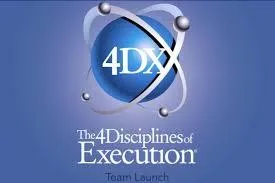
Blog

Mastering Results: A Deep Dive into "The 4 Disciplines of Execution"
In the realm of personal and organizational effectiveness, achieving goals and driving results are paramount. However, the process of setting and attaining these objectives can sometimes be elusive, leaving many individuals and businesses feeling frustrated and stagnant. This is precisely where "The 4 Disciplines of Execution" (4DX) steps in as a guiding light.
Authored by Chris McChesney, Sean Covey, and Jim Huling, "The 4 Disciplines of Execution" presents a powerful framework aimed at enabling individuals and organizations to achieve their wildly important goals (WIGs) with focus, discipline, and remarkable outcomes. Let's embark on a journey through the core principles of this book and learn how to apply them for transformational success.
Discipline 1: Focus on the Wildly Important Goals (WIGs)
The first discipline is about narrowing your focus to the most critical goals that will make a substantial impact. It's all about identifying the "Wildly Important Goals" (WIGs) that, if achieved, will significantly drive progress and success. This principle emphasizes quality over quantity, encouraging individuals and teams to concentrate their efforts and resources on a select few objectives.
To effectively apply this discipline, start by defining 2-3 WIGs that align with your long-term vision. These should be specific, measurable, achievable, relevant, and time-bound (SMART). By concentrating on a limited number of goals, you increase the likelihood of achieving them and drive heightened focus and engagement within your team.
Discipline 2: Act on the Lead Measures
Once you've identified your WIGs, Discipline 2 comes into play. It involves pinpointing the key drivers or "Lead Measures" that influence the achievement of your WIGs. Unlike lag measures, which track the outcome after the fact, lead measures are proactive indicators that can be influenced and modified to drive the desired results.
For every WIG, carefully identify the lead measures that have the most significant impact. Utilize data and analytics to track and manage these lead measures effectively. By doing so, you can adapt and refine your strategies in real-time to stay on course towards achieving your goals.
Discipline 3: Keep a Compelling Scoreboard
Discipline 3 emphasizes the importance of visualizing progress through a "Compelling Scoreboard." It's a dynamic tool that keeps the team engaged, informed, and motivated by providing a clear, real-time view of their performance. A compelling scoreboard should be simple, engaging, and easy to understand at a glance.
When everyone can see their progress and how their actions contribute to the achievement of the WIGs, they are more likely to stay focused and committed. Regularly reviewing and updating the scoreboard allows for continuous improvement and alignment towards the desired results.
Discipline 4: Create a Cadence of Accountability
The final discipline centers around creating a rhythm of accountability to ensure that everyone remains committed to their goals and lead measures. This "Cadence of Accountability" involves regular, team-based progress reviews where team members openly discuss their commitments, progress, and challenges.
During these sessions, individuals take ownership of their responsibilities and hold each other accountable for meeting commitments. Celebrating achievements and offering support for areas that need improvement fosters a culture of accountability and teamwork, which is crucial for successfully executing the plan.
Putting It All Together
Incorporating these four disciplines into your personal or organizational strategy can be transformative. By focusing on the Wildly Important Goals (WIGs), acting on lead measures, maintaining a compelling scoreboard, and establishing a cadence of accountability, you can drive meaningful results and create a culture of excellence and achievement.
Remember, the 4 Disciplines of Execution isn't just a theoretical concept; it's a roadmap to success. Through consistent application and adaptation, you can master the art of execution, surpassing your goals and making a lasting impact in your personal and professional life.
To learn more about the services we offer, please click here. To get in touch with me, please click here or give me a call at (617) 281-3215.

Mastering Results: A Deep Dive into "The 4 Disciplines of Execution"
In the realm of personal and organizational effectiveness, achieving goals and driving results are paramount. However, the process of setting and attaining these objectives can sometimes be elusive, leaving many individuals and businesses feeling frustrated and stagnant. This is precisely where "The 4 Disciplines of Execution" (4DX) steps in as a guiding light.
Authored by Chris McChesney, Sean Covey, and Jim Huling, "The 4 Disciplines of Execution" presents a powerful framework aimed at enabling individuals and organizations to achieve their wildly important goals (WIGs) with focus, discipline, and remarkable outcomes. Let's embark on a journey through the core principles of this book and learn how to apply them for transformational success.
Discipline 1: Focus on the Wildly Important Goals (WIGs)
The first discipline is about narrowing your focus to the most critical goals that will make a substantial impact. It's all about identifying the "Wildly Important Goals" (WIGs) that, if achieved, will significantly drive progress and success. This principle emphasizes quality over quantity, encouraging individuals and teams to concentrate their efforts and resources on a select few objectives.
To effectively apply this discipline, start by defining 2-3 WIGs that align with your long-term vision. These should be specific, measurable, achievable, relevant, and time-bound (SMART). By concentrating on a limited number of goals, you increase the likelihood of achieving them and drive heightened focus and engagement within your team.
Discipline 2: Act on the Lead Measures
Once you've identified your WIGs, Discipline 2 comes into play. It involves pinpointing the key drivers or "Lead Measures" that influence the achievement of your WIGs. Unlike lag measures, which track the outcome after the fact, lead measures are proactive indicators that can be influenced and modified to drive the desired results.
For every WIG, carefully identify the lead measures that have the most significant impact. Utilize data and analytics to track and manage these lead measures effectively. By doing so, you can adapt and refine your strategies in real-time to stay on course towards achieving your goals.
Discipline 3: Keep a Compelling Scoreboard
Discipline 3 emphasizes the importance of visualizing progress through a "Compelling Scoreboard." It's a dynamic tool that keeps the team engaged, informed, and motivated by providing a clear, real-time view of their performance. A compelling scoreboard should be simple, engaging, and easy to understand at a glance.
When everyone can see their progress and how their actions contribute to the achievement of the WIGs, they are more likely to stay focused and committed. Regularly reviewing and updating the scoreboard allows for continuous improvement and alignment towards the desired results.
Discipline 4: Create a Cadence of Accountability
The final discipline centers around creating a rhythm of accountability to ensure that everyone remains committed to their goals and lead measures. This "Cadence of Accountability" involves regular, team-based progress reviews where team members openly discuss their commitments, progress, and challenges.
During these sessions, individuals take ownership of their responsibilities and hold each other accountable for meeting commitments. Celebrating achievements and offering support for areas that need improvement fosters a culture of accountability and teamwork, which is crucial for successfully executing the plan.
Putting It All Together
Incorporating these four disciplines into your personal or organizational strategy can be transformative. By focusing on the Wildly Important Goals (WIGs), acting on lead measures, maintaining a compelling scoreboard, and establishing a cadence of accountability, you can drive meaningful results and create a culture of excellence and achievement.
Remember, the 4 Disciplines of Execution isn't just a theoretical concept; it's a roadmap to success. Through consistent application and adaptation, you can master the art of execution, surpassing your goals and making a lasting impact in your personal and professional life.
To learn more about the services we offer, please click here. To get in touch with me, please click here or give me a call at (617) 281-3215.
